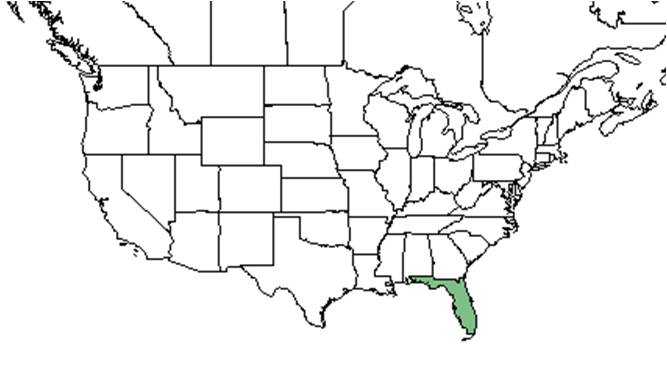Difference between revisions of "Dicerandra frutescens"
KatieMccoy (talk | contribs) (→Description) |
KatieMccoy (talk | contribs) (→Description) |
||
| Line 22: | Line 22: | ||
==Description== | ==Description== | ||
<!-- Basic life history facts such as annual/perrenial, monoecious/dioecious, root morphology, seed type, etc. --> | <!-- Basic life history facts such as annual/perrenial, monoecious/dioecious, root morphology, seed type, etc. --> | ||
| − | ''D. frutescens'' is a short-lived perennial, suffruticose species with a shallow tap root (Huck 1987; Menges 1992). Species of ''Dicerandra'' contain essential oils and terpenoid mixtures that gives each species an unique odor (McCormick et al. 1993). | + | ''D. frutescens'' is a short-lived perennial, suffruticose species with a shallow tap root (Huck 1987; Menges 1992). There are two types of shoots: vegetative and reproductive<ref name="FWS">[[https://www.fws.gov/verobeach/MSRPPDFs/ScrubMint.PDF FWS]]Accessed: December 9, 2015</ref>. Species of ''Dicerandra'' contain essential oils and terpenoid mixtures that gives each species an unique odor (McCormick et al. 1993). |
==Distribution== | ==Distribution== | ||
Revision as of 15:55, 10 December 2015
| Dicerandra frutescens | |
|---|---|
Error creating thumbnail: Unable to save thumbnail to destination
| |
| Scientific classification | |
| Kingdom: | Plantae |
| Division: | Magnoliophyta - Flowering plants |
| Class: | Magnoliopsida - Dicotyledons |
| Order: | Lamiales |
| Family: | Lamiaceae ⁄ Labiatae |
| Genus: | Dicerandra |
| Species: | D. frutescens |
| Binomial name | |
| Dicerandra frutescens Shinners | |

| |
| Natural range of Dicerandra frutescens from USDA NRCS Plants Database. | |
Common name: scrub balm
Contents
Taxonomic notes
Description
D. frutescens is a short-lived perennial, suffruticose species with a shallow tap root (Huck 1987; Menges 1992). There are two types of shoots: vegetative and reproductive[1]. Species of Dicerandra contain essential oils and terpenoid mixtures that gives each species an unique odor (McCormick et al. 1993).
Distribution
Ecology
Habitat
In the Coastal Plain in Florida, D. frutescens has been found in xerophytic oak-sand pine scrubs (FSU Herbarium).
Phenology
Seed dispersal
Seed bank and germination
Fire ecology
Pollination
The following Hymenoptera families and species were observed visiting flowers of Dicerandra frutescens at Archbold Biological Station (Deyrup 2015):
Apidae: Apis mellifera, Bombus impatiens, B. pennsylvanicus
Halictidae: Augochlorella aurata, Lasioglossum placidensis
Megachilidae: Megachile petulans
Use by animals
Diseases and parasites
Conservation and Management
Cultivation and restoration
Photo Gallery
References and notes
Deyrup, M.A. and N.D. 2015. Database of observations of Hymenoptera visitations to flowers of plants on Archbold Biological Station, Florida, USA.
Florida State University Robert K. Godfrey Herbarium database. URL: http://herbarium.bio.fsu.edu. Last accessed: October 2015. Collectors: P. Alcorn, Steven P. Christman, Robert K. Godfrey, Walter S. Judd, J.D. Skean. States and Counties: Florida: Highlands. Compiled by Tall Timbers Research Station and Land Conservancy.